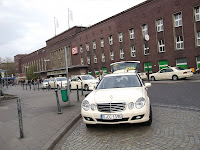Can our city planners take a leaf out of the Dusseldorf book?





In Chennai, we have trains, buses, taxis, autorickshaws, the MRTS and now in a few years the Metro. But except perhaps at the Central or Egmore railway stations, how easy is it to connect to the different places in the city? Not very.
If you are to travel on the MRTS (mass rapid transport system), and if you are a lone woman you need the courage because the stations are ill-lit, lonely and infested with anti-social elements, you are not likely to find any mode of transport outside the station to ferry you to the place you wish to go. A classic example is the Indira Nagar MRTS station. If you are to emerge from here, you will be greeted by vehicles whizzing by on the toll road outside, with little chance of an auto stopping by. The same can be said of the Mylapore and Thiruvanmiyur stations, perhaps the whole lot. Which clearly shows lack of proper planning. Even if there are autos outside the Mambalam or Kodambakkam railway stations, the drivers are waiting to fleece you, and you have to walk quite a distance to reach a bus stop. I wonder whether the Metro Rail will provide better connectivity, but knowing how our planners work it may not be very different from what we have presently.
It’s so very different in some of the places I have visited abroad. In Dusseldorf, for example, you can straightaway head for the subway from inside the main station if you wish to catch a train. Once outside, there are taxis lined up and a few metres away, tram and bus stops. It’s all public transport. Taxis run on meters and if the distance is too short the drivers advise you to walk, luggage and all. Imagine what our guys here would do!
I did not see any private public transport as such, certainly no autorickshaw type of vehicle. The point is that public transport is so well maintained and reliable that it will put even our best private transport (Volvo buses within and outside Chennai, if you will) to shame. For one, there is no conductor; it is assumed people are honest and will pay, and they do. There are ticket checkers on trains and they are friendly and cheerful, greeting you before punching the ticket and wishing you a pleasant journey.
I noticed a bus driver, an attractive blonde, greeting every passenger who got in and they in turn wished her as well. Our conductors and drivers don’t even know how to smile; the moment they are on the bus they think they are headmasters descended from heaven.
So, effectively, with such wonderful public transport, fixed fares and friendly staff, there is no bargaining, no waste of time and energy, no bad words exchanged. Everything is well and everyone exudes a positive energy. There is no crowding, forget overcrowding. That of course has to do with the population. A nation of 1.2 billion, and counting every second, just cannot hope for that kind of thing. But at least our city administrators can learn from such examples and try to replicate them here, such as providing better connectivity, penalising auto drivers who fleece passengers and putting an end to such practice, and ensuring that travelling by public transport is a pleasure, which will result in even the better-off or elite to use such services instead of taking out the car every time. Will it ever happen in our lifetime?
Pictures show taxis (all Mercedes Benz and BMWs) lined outside the Dusseldorf main station; the inside of a bus that had the driver greeting passengers as they entered from the front; luxury trams just a few yards away from the station entrance; a poodle on a bus (pets are allowed on trains and buses); and the inside of a local train on which I travelled.
Comments